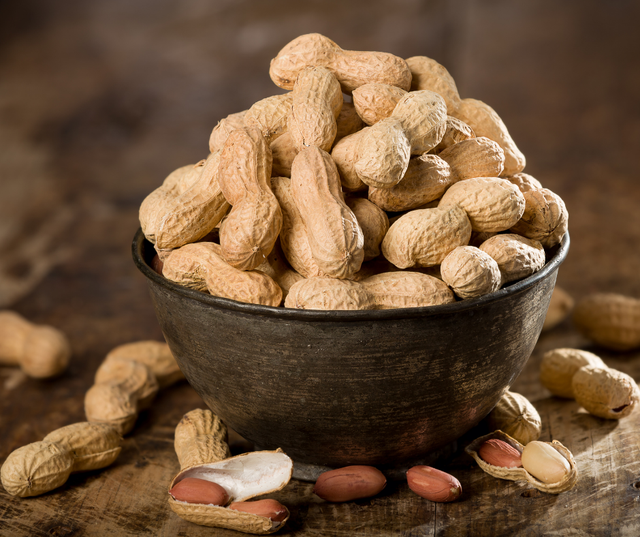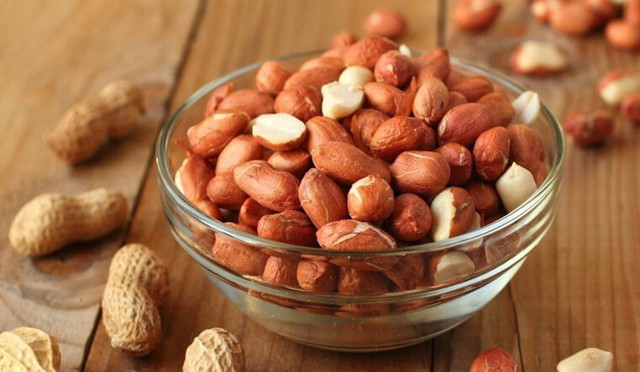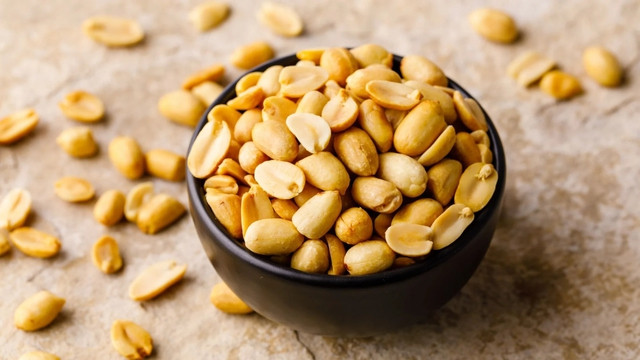5 outstanding health benefits of eating peanuts
Peanuts are a popular nut. However, many people do not know the benefits of eating peanuts.
Peanuts are packed with essential nutrients and when eaten daily can boost overall health and immunity.
1. Nutritional composition of peanuts
Peanuts are a legume that grows underground. 100g of raw peanuts contain:
Calories: 567 Water: 7% Protein: 25.8g Carbs: 16.1g Sugars: 4.7g Fiber: 8.5g Fat: 49.2g Saturated Fat: 6.28g Monounsaturated Fat: 24.43g Polyunsaturated Fat: 15.56g Omega-3: 0g Omega-6: 15.56g
2. Vitamins and minerals in peanuts

Peanuts are also an excellent source of many vitamins and minerals, including:
Biotin: Peanuts are one of the richest sources of biotin, which is good for healthy skin, hair, eyes, liver and nervous system, which is important during pregnancy.
Copper: As a dietary trace mineral, copper deficiency can adversely affect heart health.
Niacin: Also known as vitamin B3, niacin has many important functions in the body. It has been linked to a reduced risk of heart disease.
Folate: Also known as vitamin B9 or folic acid, folate has many essential functions and is especially important during pregnancy.
Manganese: A trace element, manganese is found in drinking water and most foods.
Vitamin E: A powerful antioxidant, this vitamin is often found in high amounts in fatty foods.
Thiamine: One of the B vitamins, thiamine is also known as vitamin B1. It helps cells in your body convert carbs into energy and is essential for heart, muscle, and nervous system function.
Phosphorus: Peanuts are a rich source of phosphorus, a mineral that plays an essential role in the growth and maintenance of body tissues.
Magnesium: An essential dietary mineral with a variety of important functions, adequate magnesium intake is thought to protect against heart disease. Peanuts are an energy-dense and nutrient-dense food. When raw (unroasted) and unsalted, peanuts contain only 3mg of sodium per 28g serving.
Roasting peanuts increases the fat content by about 0.3g per serving. Salted peanuts can contain more than 100mg of sodium per serving. The 2020-2025 Dietary Guidelines for Americans recommend limiting sodium to 2,300mg and 1,500mg for people with high blood pressure or heart disease. There are also options for low-salt peanuts and other nuts, which reduce sodium to less than 50mg per serving, according to USDA Organic Certification.
3. 5 health benefits of peanuts
3.1 - Peanuts contain many antioxidants

A 2022 study in the Journal of Food Biochemistry identified peanuts as a food rich in a variety of antioxidants. These antioxidants include phenolic acids and flavonoids, which are also found in green and black teas, apples, red wine, and soybeans. A 2021 study in Food Science & Nutrition found that peanut skins contain a variety of antioxidant and anti-inflammatory compounds that, in theory, support good health.
Another 2020 study in the journal Food Science and Human Health found that nut consumption was associated with a lower risk of cardiovascular disease in both men and women; and lower risk of diabetes in women in large-group studies. So, sprinkle peanuts on your salad or soup and spread some peanut butter on your toast for breakfast.
3.2 - Peanuts support weight loss and maintain a healthy weight
Although peanuts may seem high in calories, the fiber, protein, and healthy fat content in peanuts can help promote satiety, making you feel fuller for longer. This can help curb hunger and prevent overeating. Peanuts are a great snack if someone is trying to lose weight or maintain a healthy weight.
In fact, research has found that nuts may play an important role in weight regulation. A 2022 study in Nutrients found that eating about 28g of peanuts before two meals a day while on an energy-restricted diet resulted in weight loss comparable to that of a low-fat diet. People who ate peanuts also had lower blood pressure, which may reduce their risk of heart disease.
3.3 - Peanuts improve cardiovascular health

In 2023, in the journal Food, peanuts contained a combination of soluble and insoluble fiber that provided many benefits for heart health, one of which was helping to lower LDL (bad) cholesterol levels.
Peanuts also contain niacin (vitamin B3), which is important for healthy heart function. A similar 2020 review in the journal Food Science and Human Health found that consuming about 42g of peanuts per day for 12 weeks helped participants reduce blood pressure, cholesterol, and triglyceride levels. Additionally, the anti-inflammatory effects of the antioxidants in peanuts may help reduce the risk of coronary heart disease.
3.4 - Peanuts help balance blood sugar
The combination of protein, fiber, and healthy fats in peanuts can help stabilize blood sugar levels and prevent glucose spikes after meals. This can be beneficial for people with diabetes or those at risk of diabetes.
A 2021 study in the American Journal of Clinical Nutrition found that eating peanut butter specifically was inversely associated with developing type 2 diabetes. So, you can add peanuts and peanut butter to your daily favorite dishes.
A 2019 study in Circulation Research found that snacking on nuts like peanuts may also help reduce the risk of complications for people with diabetes. In the study, people who increased their nut consumption after being diagnosed with diabetes had an 11% lower risk of cardiovascular disease, a 15% lower risk of coronary heart disease, and a 27% lower risk of death from all causes.
3.5- Peanuts improve bone health
Peanuts are a good source of magnesium, phosphorus, and other minerals that help maintain strong bones. Peanuts contain small amounts of calcium and vitamin D, which work together to promote healthy bones and teeth.
Peanuts are nutritious, affordable, and have been a popular food for humans for a long time. Therefore, including peanuts as part of a diet can improve heart health, reduce the risk of diabetes, promote a healthy weight, and promote bone health.
However, it should be noted that a few people should not eat peanuts when experiencing digestive symptoms such as bloating, flatulence, cramps or constipation... Those who have had an allergic reaction to peanuts should avoid them completely.


